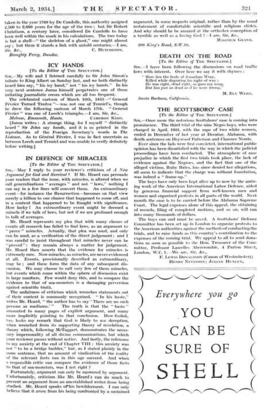IN DEFENCE OF MIRACLES
[To the Editor of THE SPECTATOR.] Sm,--May I reply to your reviewer's criticism of A New Argument for God and Survival ? If Mr. Heard can persuade your readers that the issue, with miracles, is altered when we call generalizations " averages " and not laws," nothing I can say in a few lines will convert them. An extraordinary event—for instance the Resurrection—becomes on that view merely a billion to one chance that happened to come off, and in a context that happened to be fraught with significance. How lucky ! An extraordinary event might be deemed a miracle if we talk of laws, but not if we are profound enough to talk of averages.
Mr. Heard represents my plea that with many classes of events all research has failed to find laws, as an argument to prove " miracles. Actually, that plea was used, and only can be used, as a verification of the direct judgement ; and I was careful to insist throughout that miracles never can be "proved" : they remain always a matter for judgement. Mr. Heard then asserts that the evidence for miracles is extremely rare. Now miracles, as miracles, are never evidenced at all. Events, provisionally described as extraordinary, may be ; and these form the data of any subsequent dis- cussion. We may choose to call very few of them miracles, but events which come within the sphere of discussion exist in large numbers. Few would deny this, and to compare the evidence to that of sea-monsters is a damaging perversion against scientific truth.
The unfairness of criticism which wrenches statements out of their context is commonly recognized. " In his haste," writes Mr. Heard, " the author has to say ' There are no such
persons as mediums.' " The truth is that the " haste amounted to many pages of explicit argument, and many more implicitly pointing to that conclusion. How foolish, too, looks my remark that God is likely to use deception, when wrenched from its supporting theory of revelation, a theory which, following MeTaggart, demonstrates the neces- sary impersonality of all divine .communications, but which your reviewer passes without notice. And lastly, the reference to my, anxiety at the end of Chapter VIII : this anxiety was not " to be a bridge builder," but, as I stated plainly in the same sentence, that no amount of vindication of the reality of the releyant facts can in this age succeed. And when a responsible critic can compare the evidence of those facts to that of sea-monsters, was I not right ?
Fortunately, argument can only be answered by argument. Unfortunately, criticism ,like Mr, tleard's can do much to prevent an argument from an unestablished writer from being studied- Mr- Heard speaks ofhis bewilderment. I can only believe that it arose from his being confronted by a, sustained argument, in some respects original, rather than by the usual restatement of comfortable . scientific and religious cliches. And why should he be amazed at the orthodox conception of a terrible as well as a loving God ?—I am, Sir, &c., 396 King's Road, S.W.10.
MALCOLM GRANT.




























































 Previous page
Previous page